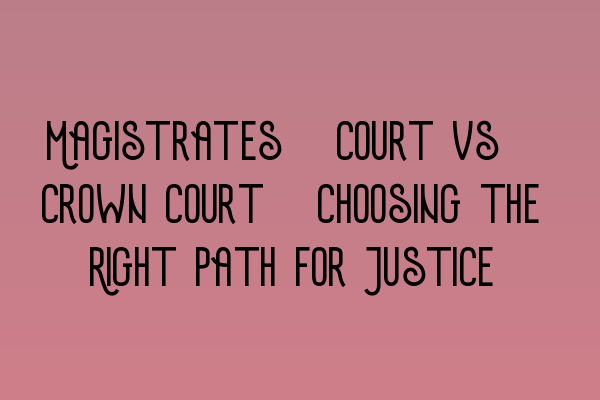Magistrates’ Court vs. Crown Court: Choosing the Right Path for Justice
When it comes to criminal proceedings in the UK, understanding the difference between Magistrates’ Court and Crown Court is crucial. Each court has its own characteristics, processes, and outcomes, which can greatly impact the outcome of a case. As a solicitor, it is essential to guide clients in choosing the right path for justice.
Magistrates’ Court
Magistrates’ Court, also known as the lower court, deals with less serious criminal cases. It is presided over by a panel of magistrates, who are laypeople without formal legal training. The court handles cases such as minor assaults, theft, public order offenses, and motoring offenses. In more serious cases, the Magistrates’ Court acts as an initial point of referral before being transferred to the Crown Court.
At Magistrates’ Court, defendants do not have a right to a jury trial. The decision is made solely by the magistrates based on the evidence presented by both the prosecution and the defense. This makes the process quicker and more cost-effective. However, if a defendant pleads not guilty, the case may be adjourned for a later date to allow for additional evidence gathering and for a trial at Crown Court.
It is important to note that legal representation can be provided at Magistrates’ Court, either through a solicitor or a barrister. If a defendant cannot afford representation, they may be eligible for legal aid.
Crown Court
Crown Court, on the other hand, deals with more serious criminal cases, including murder, rape, robbery, drug offenses, and complex fraud cases. The court is presided over by a judge and a jury comprised of 12 members of the public. The jury makes the final decision on the guilt or innocence of the accused.
The Crown Court offers a more formal and comprehensive trial process, involving opening and closing statements, examination and cross-examination of witnesses, and presentation of evidence. The trial at Crown Court is usually longer and more complex, often involving legal experts and multiple witnesses.
Defendants in Crown Court have the right to legal representation, and it is highly recommended to engage a skilled barrister, who specializes in criminal law and has expertise in courtroom advocacy. This ensures that their case is presented effectively, and their rights are protected throughout the proceedings.
Choosing the Right Path for Justice
The decision of whether to proceed at Magistrates’ Court or Crown Court depends on various factors, such as the nature and seriousness of the offense and the potential penalties involved. For less serious offenses where a custodial sentence is unlikely, opting for Magistrates’ Court may be more pragmatic due to the shorter process and reduced costs.
However, for more complex or serious cases, where the potential penalties are severe, such as life imprisonment or substantial financial penalties, pursuing a trial in Crown Court can provide a more robust and fair hearing.
As a solicitor, it is your responsibility to assess the details of the case, consider the wishes and expectations of the client, and provide expert legal advice that will guide them towards the most appropriate path for justice.
In conclusion, understanding the differences between Magistrates’ Court and Crown Court is essential for making informed decisions in criminal proceedings. Whether it is the Magistrates’ Court or the Crown Court, ensuring proper legal representation and guidance is imperative for achieving the best possible outcome for clients.
Related Articles:
- SQE 1 Practice Exam Questions
- SQE 1 Practice Mocks FLK1 FLK2
- SQE 2 Preparation Courses
- SQE 1 Preparation Courses
- SRA SQE Exam Dates
